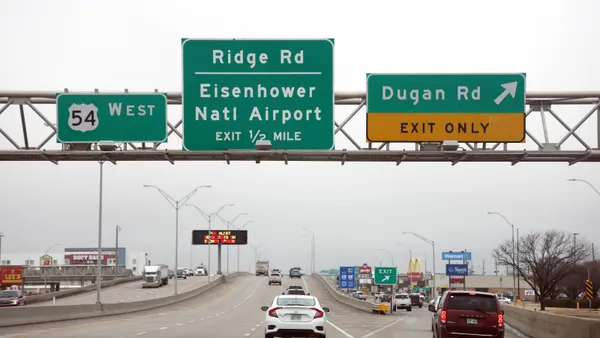Dive Brief:
- The Pennsylvania Department of Transportation (PennDOT) said Liberty Bridge contractor Joseph B. Fay Co. owes $3.3 million in liquidated damages as a result of a fire that shut down bridge traffic for 24 hours in September, according to the Tribune-Review.
- PennDOT said it used the liquidated damages provisions of the contract to come up with the amount, but neither the agency nor Fay has released estimates on total bridge repair costs.
- The $3.3 million amount is the largest single-contractor penalty in a 10-year period, with PennDOT otherwise charging more than 50 contractors a total of only $407,900 during that time, according to the Tribune-Review. Fay officials said in a statement that they will negotiate the "contractual matter" of liquidated damages, a process that will take into consideration the actions of its employees and their efforts to mitigate the effect on the project schedule.
Dive Insight:
According to Pittsburgh officials, hot slag generated by one of Fay's welders started a fire that was strong enough to call into question the integrity of the bridge's support structure. Ostensibly, the slag set fire to a PVC pipe, which caused a tarp to catch fire, igniting a flame so hot that it bent steel.
In addition, Fire Chief Darryl Jones announced last month that Fay had not pulled the required $16 permit to perform hot work, like welding. The permit would have required a fire inspection and a designated fire watcher, but Fay said the company had its own "fire watch" team with hoses and extinguishers on the bridge when the fire began. The company also said it was not aware the work needed a permit. After the accident, PennDOT said its $80 million contract with Fay allowed for a $213,000 per-day penalty for bridge closures, as well as back charges for repairs.
OSHA is investigating the fire as well — a process that could take as long as six months — and a former OSHA official said the focus should not be on the fire and penalty but on what changes should be made to make sure a similar incident doesn't happen again.
National Fire Prevention Week was held last month, and Steve Miller, safety director for McCarthy Building Companies told Construction Dive that one of the dangers of hot work is that sometimes employees are not paying attention to where the resulting sparks land. Jim Reen, Norwood, MA–based Gaston Electrical's vice president of operations, said Boston is getting ready to implement a hot work permit requirement as well, mandating inspections and additional training for employees.













